With a unique capability of offering concept-to-commercialization services to their clients, making continuous production improvements for commercialization is a key focus.
Chemical Manufacturing Leader Polysciences Partners With Formic to Introduce Automation To Their Production Process
Alex Koepsel, Head of Product Marketing | Formic
Polysciences has been providing innovative chemical solutions since 1961. Staffed by best-in-class chemical and biochemical scientists and equipped with everything from research and development labs to full production facilities, they provide a wide variety of chemical solutions, with a catalog of over 4,000 products.
With a unique capability of offering concept-to-commercialization services to their clients, making continuous production improvements for commercialization is a key focus. By leveraging Formic automation expertise, Polysciences was able to begin the introduction of automation into their facility.
Their initial deployment has achieved:
- Increased work safety and ergonomics by eliminating repetitive lifting of 30 lb boxes over multiple 10-hour shifts
- Increased operational efficiency by eliminating a labor-dependent task that had become a production bottleneck, reassigning those employees to more valuable tasks
- 35% OpEx reduction on day 1 through Formic’s low hourly rate
Challenges
Polysciences’ tagline is “Chemistry beyond the ordinary”, but their mission does not end with the chemical process. Going “beyond the ordinary” has inspired and steered all facets of the business, from their palpable family-owned culture to their high-quality production operation.
One challenge in their growing company is managing and improving a high-quality operation to keep up with demand across multiple industries. This is a continuously demanding process. Sean Moore, Polysciences’ Executive Director of Manufacturing, calls out the 5 key pillars that they rigorously focus on: safety, quality, productivity, inventory, and delivery. “Anytime that we can find a solution to even get 1% better in any of those areas, or make a big continuous improvement leap, that’s what we’re focused on doing,” said Moore.
In constant pursuit of the highest-quality operation, another challenge emerged - the realization that making the next big leap was going to require expertise that went beyond their core business and their comfort zone. Moore and his team identified opportunities to automate their production, but it came with significant risk. “We’re a chemistry company,” said Moore, “Automation is outside our core competency and outside of what we really want to specialize in.”
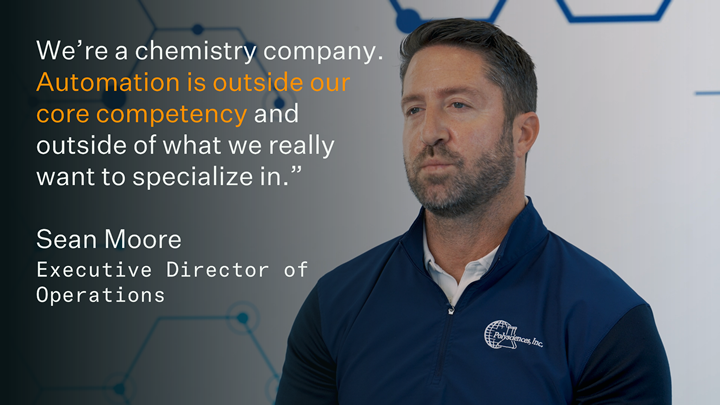
Despite the obstacles, their commitment to improvement remained. Relieving their team members from manually lifting and stacking 30 pound boxes was top of mind - they could really use those people in more productive areas. By their own guiding principles, automating this task would improve 3 of their 5 target areas by improving safety, quality, and productivity.
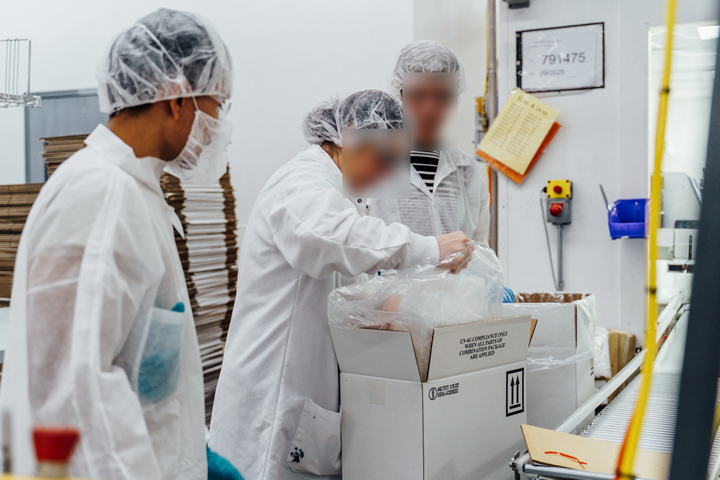
Their search for automation, however, was not easy. Polysciences’ Production Manager, Lucas Farrall, leveraged his prior robotics experience to lead the project for Polysciences, but the level of support from automation providers was lacking. “Some of the vendors that we looked at working with in the past had been slow to respond or not very interested”, said Farrall. “A lot of companies weren’t excited to work with a small to medium-sized company like us. They want the bigger contracts, the multi-million dollar capital investment projects where they're guaranteed to sell 10, 20, 100 robots to multiple facilities.”
Polysciences was experiencing the inherent challenges of how the automation industry works today. Like many small-to-medium sized manufacturers across America, they felt stranded by the automation purchase process, where attention and success favors bigger capital budgets, more resourced engineering teams, and more lucrative opportunities for the automation suppliers.While they knew automation was the right solution to drive process improvement, they had a hard time finding the right way to get started for their business.
Solution
Polysciences’ situation was an ideal match for Formic’s mission and Pay-for-Productivity(™) model. Formic breaks down the barriers of automation’s prerequisite expertise, high capital cost, long-term rigidity, and ongoing performance and maintenance risks that manufacturers must absorb in the traditional automation adoption process.
After discovering Formic at a packaging trade show in 2022, Polysciences evaluated and ultimately selected Formic as their automation partner. Through hands-on collaboration with Polysciences, Formic scoped and deployed a robotic palletizing solution from their Formic Stack(™) suite of solutions, and assigned the ongoing maintenance team to monitor the system - all for $0. Polysciences only pays an hourly usage rate for the equipment. Formic provides Polysciences with the flexibility that comes with the OpEx-based model while providing ongoing support for the system.
In Polysciences’ case, they needed 30 lb boxes stacked across 2 shifts, 6 days per week. Not only did Formic’s solution deliver those results, but it also received eyebrow-raising reactions from Polysciences. Their team was surprised by how little floor space was needed and how easy it was to use the system.
“When Formic proposed a robotic palletizer”, said Farrall, “I was a little concerned about it fitting in our facility. When it arrived we were surprised to see how compact it was and how safe it is without any fencing.” Now after several months of production usage, Farrall is pleased to add that “It works great. We haven’t had any issues at all.”
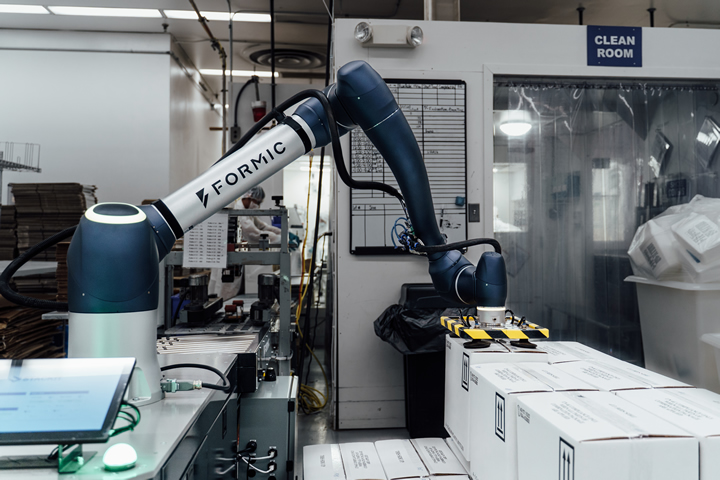
Beyond the equipment, what Polysciences has been most pleased with is the service. In addition to the technological round-the-clock equipment monitoring, Formic’s delivers a true full-service partnership that begins when the contract is signed and continues throughout the entire contract.
“Working with Formic has been awesome”, said Farrall. “From the start, they immediately reached back out to us, were visibly excited to meet our team and to come in here and see everything, and they’re very attentive to detail. And really, the quick responses and just being on top of everything is a breath of fresh air. And through working with the Formic team, everybody is very knowledgeable on automation.” Formic helped Polysciences navigate the confusing process of automation adoption and made it easy - delivering the results that Moore, Farrall, and the operations team were seeking.
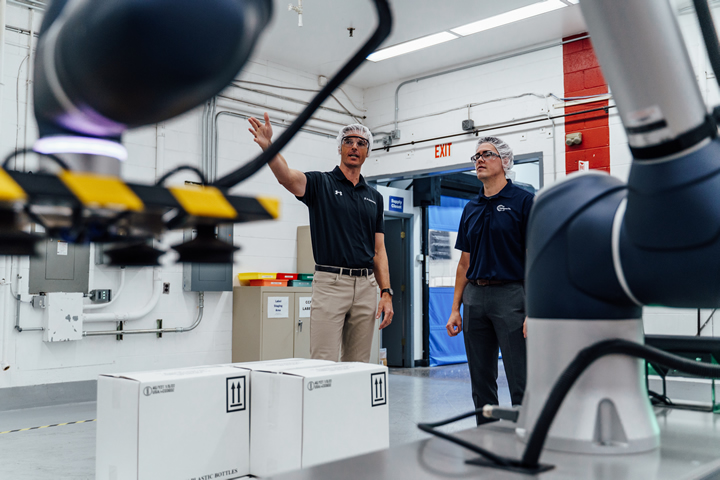
Results
Polysciences had their new system installed and integrated into their operation within 2 months of contract signing. Since installation and usage, they’re happy to report that they achieved everything they hoped to achieve, all while conserving their capital budget for other business purposes. Sean Moore, Polysciences Director of Operations summarized their results as “helping in all the areas we thought it would, plus some.”
Measuring the outcomes against their 5 focus pillars, it checked all the boxes. “First of all, from a safety perspective, we now don't have someone that needs to stand there and lift heavy boxes and put them on a pallet during 10 hour shifts”, said Moore. “As far as the quality, it's now 100% consistent. There is no issue with any of the boxes that are being put on the pallet. That's been awesome as well. Then the productivity - There are seven people involved in this process now, and the robot is not the bottleneck. When we look at that from a process mapping standpoint, we ask ‘what is the bottleneck of the process?’ At some points, this individual that was previously doing this task was the bottleneck, because of the safety risks involved. Now, we've completely removed the bottleneck and reassigned them to tasks farther up the line. From a safety, quality, and productivity standpoint, we’ve seen everything that we wanted to see.”
Perhaps equally valuable to the tangible, operational results was Polysciences’ newly-found confidence in integrating automation and being able to focus on what they do best - chemistry. “Our vision at Polyscience is to enable innovation through chemistry beyond the ordinary”, says Moore. “Our strategy is growth, growth, growth, but with a customer-centric mindset. For us, it's being able to work quickly with our R&D team to bring customer-centric problems to a solution quickly and get that to market. Having a reliable, high-quality production and a partner like Formic is a key part of our strategy.”
In their day-to-day operations, Farrall and his production team also appreciate the effects of the partnership. Farrall says when he recommends Formic to other manufacturers, it really comes down to simplicity. “The Formic plan keeps it very easy and takes a lot of the responsibility out of the equation”, says Farrall. Working with Formic, not only do you not need the big capital expense, but it’s a plug-and-play option that doesn't require the technical knowledge to support the equipment yourself to keep things going.”
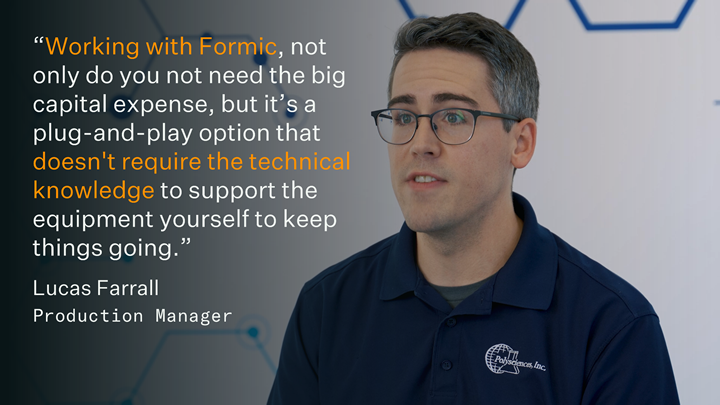
When asked about working with Formic in the future, both Farrall and Moore shared the same answer - “Absolutely”. It is truly a mutually rewarding partnership. Polysciences and Formic continue to do what they each do best, innovative chemistry and productive, risk-free automation.
The content & opinions in this article are the author’s and do not necessarily represent the views of RoboticsTomorrow
Comments (0)
This post does not have any comments. Be the first to leave a comment below.
Featured Product

